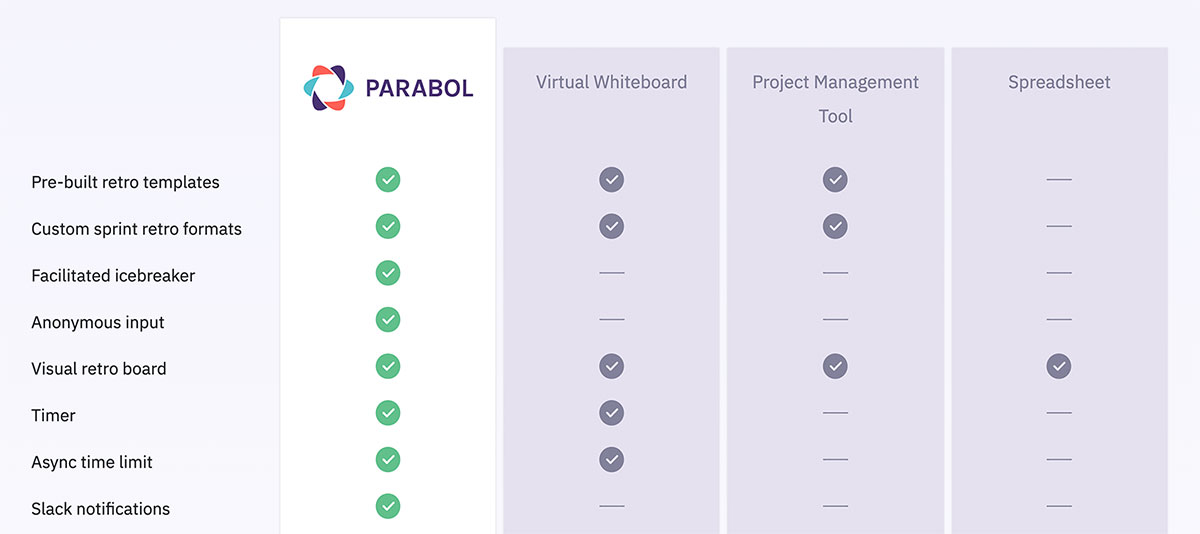Parabol Retrospectives: Engage, Empower, Execute
Imagine a typical retrospective meeting in a fictional company (but based on a real-life) that we'll call Bloom.
The team goes into a conference room or joins a Zoom call, discusses how the sprint went and uses (digital) sticky notes to say what went well and what didn't. Somewhere half-way through the static meeting, the majority of people start losing attention and drift off. Once the meeting ends, everyone leaves without a complete picture of what needs improving or a clear action plan.
But not all retrospective meetings are poorly-run.
Whether a retrospective meeting will be effective or not depends on how it's performed. If a company manages to create an environment in which honesty and openness are balanced with streamlined processes, dull retrospective meetings can be transformed into a driving force within a company.
One way how fruitless retrospectives can be transformed into productive meetings is by using a tool like Parabol.
In a nutshell, Parabol is a remote retrospective and meeting app for agile teams. It's a fantastic SaaS solution for scrum masters and other leaders who want to conduct a Lessons Learned meeting or team-building exercise.
It's a new solution on the market that acts like a digitally-coached mini-retreat, enabling creative brainstorming and other types of business-critical meetings. Whether your team is co-located in one office or distributed worldwide, Parabol can support all kinds of teams.

Enabling Meaningful Interactions at Work
A few weeks ago, an animal sanctuary called Sweet Farm started letting people rent llamas for a cameo appearance in Zoom video calls. It was clear as day: remote teams across the world are looking for creative ways to stay connected.
This is where Parabol comes in. Although it doesn't include any llamas or goats, the tool makes every real-time meeting more productive, memorable, and fun.
Here's one example of how it does that:
What animal best represents you today, and why?
If you could have one superpower today, what would it be, and for what purpose?
What simple thing still blows your mind?
Every meeting in Parabol starts with a social check-in. It's a type of icebreaker conversation that helps each attendee understand the other attendees' emotional state. This is particularly useful for remote teams who don't have the opportunity to socialize.
The company's value proposition states:
Parabol exists to enable meaningful interactions at work.
Enabling meaningful interactions is more crucial than ever. Consider this: 91% of the average meeting-goers/attendees daydream during a meeting!
In fact, millions of teams suffer from poorly structured meetings, and they don't even know it.
Parabol aims to give meetings structure and meaning. During a Parabol meeting, every attendee feels included, valued, and listened to.
Trust between teams is improved, team productivity gets a boost, and innovation is highly supported.
Oh, and it nicely integrates with Slack, Github, and Jira for a smooth workflow.
Parabol's Leading Features
Parabol offers two major features: Retrospective Meetings and Check-in Meetings.
Retrospective Meetings aim to help teams evaluate the bigger picture. Check-in Meetings aim to help teams make small, iterative improvements to daily or weekly progress.
Retrospective Meetings
Whether you're celebrating a success or uncovered problems in your operations, a retrospective meeting can save the day.
With Parabol, there's no need to worry about meeting structure or post-it notes. Parabol's software will lead your team through five rounds to ensure your agile retrospectives are productive and transformative.
For this article, we'll imagine that the team got together to discuss a sprint that didn't go well.
The retrospective meeting will evolve in the following way:
Round #1 - Icebreaker: each attendee is asked an icebreaker question such as: What are you reading right now? The goal of this round is to help each attendee understand the emotional state of the rest of the team. Attendees can more easily build rapport and form connections.
Round #2 - Reflect: each attendee shares their experiences from the previous work period in a Reflection card. For example, in her reflection card, Mary can say: We shipped without testing. The best thing about the reflection round is that the author of each Reflection card is never revealed. Doing so helps people not feel ashamed or scared to share their issues.
Round #3 - Group: this is the round where all Reflection cards are revealed. Similar reflections are grouped to uncover common themes that the team can later discuss. For example, a common theme can be we're having so many meetings.
Round #4 - Vote: during the Vote round, attendees get the chance to vote on which topics deserve the team's attention. For example, the team can vote that we're having so many meetings is more important than we shipped without testing.
Round #5 - Discuss: in the final round, the team discusses each theme and creates an action plan for how to improve. That plan of action can be captured by creating a task by the Facilitator.
Once the Retrospective Meeting ends, each attendee will receive a meeting summary. The summary outlines who attended, what was discussed, and the action plan.
Check-in Meetings
Although Check-in Meetings aim to help teams work smarter, they often feel overwhelming. From sharing information and debating to making an action plan, they can be difficult to digest in such a short period of time. As a result, you have disengaged attendees who are most likely feeling confused and frustrated.
Parabol refines those ineffective Check-in meetings and replaces them with more personable check-ins. During a Check-in Meeting, teams get a chance to discuss roadblocks, prioritize tasks, create an action plan, and track progress.
Parabol's software will lead your team through three stages for a truly powerful check-in meeting experience:
Round #1 - Icebreaker: we talked about the Icebreaker round in the Retrospective Meeting explaining above. The same thing happens during a Check-in meeting.
Round #2 - Solo Updates: in the second round, each attendee gets a chance to speak. They give an update on what they've accomplished, their current tasks, and their difficulties. For example, a teammate can say: Last week, I wrote three tech articles, now I'm writing a video script, and I'm stuck on publishing the content on social media.
Round #3 - Team Agenda: this is the stage where collective plan-building takes place. At the start of the round, team members have a few minutes to add to the list of agenda topics, such as "marketing campaign," product updates," and "sprint." The Facilitator goes through each agenda item until new task cards are created to be used until the next meeting.
Once the meeting ends, each attendee will receive a meeting summary of who attended, what was discussed, and their next tasks.
Parabol is Open-Source
If Parabol hasn't won your heart yet, it might after we say that it's open-source and free to use.
In fact, the software's source code is built and maintained by Parabol's growing online community of developers.
If you want to get an extended set of features, you can always opt for one of Parabol's paid plans, Pro and Enterprise.
The Pro plan comes with all the features from the Free plan, plus:
unlimited teams
priority customer support
enhanced account security controls
It costs $6 per month per active user.
The Enterprise plan includes everything from Pro, plus:
Private Cloud or On-Prem Hosting
annual billing
uptime SLA
SAML Single Sign-On
You should get in touch with the company for a custom quote.
The best thing is that you'll only be invoiced for an active user. If you have a user on your team who hasn't been logged in for 30 days, $6 will be omitted from your monthly bill. You can also mark users as inactive at any time, and the time spent inactive will be calculated on the next invoice.
Closing Thoughts
There's a saying at Parabol that goes:
Building a great team does not happen by accident.
Maybe Isaac Newton managed to discover gravity by accident, but when it comes to teams made up of highly complex beings who need structure, guidance, and support to remain productive and engaged, accidents don't happen.
Building a great team requires creating a safe space where people can share their opinions without fear. A comfortable environment in which people get a better understanding of project goals and a clear action plan for what happens next.
Parabol can be that safe and comfortable place. A place that takes every team member's thoughts and feelings into account, where issues are discovered early on, and process improvements are made.
The benefits of using Parabol are not limited to effective retrospective meetings. Effective retrospectives can improve employee engagement, bring team members closer together, and empower your team to innovate and execute.
Website: https://www.parabol.co/










